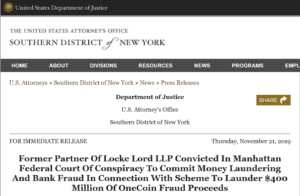Mark S. Scott, a 51-year-old attorney from Florida, has been convicted for his involvement in the fraudulent cryptocurrency scheme known as OneCoin, which collected over $4 billion from investors misled into believing they were buying into a legitimate digital asset. A federal jury in New York found that Scott helped move roughly $400 million out of the U.S. while working to hide its origins and ownership.
The verdict came after a three-week trial, during which email exchanges between Scott and OneCoin founder Ruja Ignatova were revealed. In the emails, Ignatova requested Scott to “park” funds for her in return for a fee, and Scott assured her of confidentiality.

Prosecutors stated that Scott, a former equity partner at Locke Lord LLP, was paid approximately $50 million for his role. His defense argued that he was unaware OneCoin was fraudulent and claimed he was simply acting on instructions from Ignatova.
Nonetheless, the jury rejected this narrative. According to court findings, Scott used his legal expertise to create fake investment vehicles, which were then used to launder hundreds of millions of dollars generated from the scheme. He allegedly spent the illicit proceeds on luxury watches, sports cars, a yacht, and waterfront real estate. Once proud of earning “50 by 50” — $50 million before turning 50 — Scott now faces up to 50 years in prison.
The OneCoin Fraud Network
U.S. authorities described OneCoin as a massive global pyramid scheme. Founded around 2014 in Sofia, Bulgaria by Ruja Ignatova, the company operated as a multi-level marketing enterprise, offering commissions to members for recruiting others into purchasing crypto “packages.”
OneCoin claimed a user base of over three million globally. Between late 2014 and mid-2016 alone, the company reportedly generated €3.35 billion in revenue and claimed €2.23 billion in profits. Despite numerous investigations, OneCoin continues to operate.
Ignatova’s brother, Konstantin Ignatov, who testified against Scott, also pleaded guilty to charges related to the scam. Meanwhile, American investors affected by the scheme are pursuing civil action against Scott in hopes of recovering lost funds.